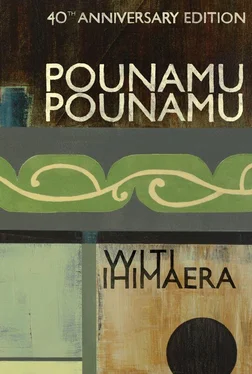‘Yes, Dad.’
‘From now on, I expect you to not only put in your work at home but also help out in the community. Being a man means being responsible not only for yourself and your family but also for your iwi. Nani Tama told me the septic tank is blocked down at the marae so, this afternoon, after school, you can help me to fix it. Speaking of Nani Tama, he needs somebody clever to help him rewrite the whakapapa that was lost when his and Miro’s house burnt down and to help him with our Treaty claim. You can go over to see him this evening and offer to do it. Who knows? You might learn more about being a man, and the obligations you have as a Maori, by doing that.’
‘All that as well as his usual work?’ Mum asks. ‘Don’t you think it’s a bit much, Dad?’
Dad shakes his head.
‘No, Mum. Hema is a man now and he understands, don’t you son!’
‘Yes, Dad,’ Hema sighs dismally.
‘And from now on, we don’t just give pocket money; you earn it!’
‘He’s got to do the dishes too!’ Georgina spits.
‘No, men don’t do dishes,’ Dad says. ‘It’s about time Hine started doing some work around here.’
‘Oh, Da-aad!’ Hine wails.
But Dad puts his hands up to stop the commotion.
‘I have spoken. So be it and all of you, get to it!’
The family sweeps into action. Georgina begins to clear the table. She glares murderously at Hema.
(You rat!)
(Ha-ha, ha-ha, Geor-giiinaa)
(I’ll get you for this)
Hema gets up. He goes into his bedroom and gets dressed for school. He may only be five foot two and a quarter inches tall, but he’s a man now. Dad has said so. And then he hears Dad at the door. Dad has a sad look on his face.
‘Don’t be in too much of a hurry to be a man, Hema,’ he whispers. ‘When you’re a boy you can stay at the back. But when you’re a man you have to go to the front.’
Then he is gone.
Humming to himself, Hema checks his appearance and then goes to feed the dogs. And suddenly, he remembers all the chores he has to do this morning. And the new jobs that Dad has begun piling on him.
And as he goes down the steps of the back verandah, the vision of being a man becomes suddenly appalling.
Hema swears to himself. He is thirteen years old and now he has to do more work! What an awful thought! He already does enough around this blankety blank place. When he was a kid, life was free and easy. Now that he’s a man, he’s got more responsibility.
He wanders down the path and past the henhouse. The hens cackle and gloat about him.
‘Shut up, you bloody fowls!’ Hema rages. And his breath explodes upon the morning air.
Why is he thirteen? Who wants to be more than five feet two and a quarter inches tall! Everybody picks on him. They make him a man before he’s ready. The whole world is against him.
It just isn’t fair.
ONE SUMMER MORNING
You can’t imagine what it was like to be writing in London through 1971, stuck in that bed-sitting room with the city shouting ‘Come out! Come out! Come and play!’ But I wasn’t writing all the time; I liked to play truant with the many friends Jane and I had made in the city and … well … I was lucky that I had discovered through my training in writing radio stories how to write fast, in the moment, and without thinking of what I was doing — the words just came up and out of me without hitting the sides. I think that having one leg still in one culture but the other leg now stretching to stand in London also helped to increase the emotion going into the stories; that further distance, I suspect, increased their sense of nostalgia.
Partway through our holiday, Jane and I made a mad dash to Paris, and we also bought a minivan and made trips around the countryside, coaxing the minivan through Wales to the Highlands of Scotland and back, sleeping in it on the way. I had a small notebook with me and was making notes for stories — writing through life rather than waiting for writing time to come along — and typing them up when we returned to London. By the time 1971 ended I had completed the stories and the novel, Tangi , packaged them up and sent them by airmail back to New Zealand.
‘One Summer Morning’ was in that package. It deals with the time when, after living for some years at Haig Street, Dad bought a farm on the Whakarau road, Te Karaka. Although we still kept the house in town at Haig Street, Mum and Dad shifted us out there when I was thirteen. By that time my sisters and I had been joined by my brother Derek. Two more siblings, Neil and Gay, were still to come, ten years later — making us eight all told, including a brother, Thomas, who died as an infant.
Although the work was hard, I loved living on the farm. Sure it was isolated, no electricity, no flushing toilet, but I had my sisters and brothers to play with and, in particular, a loving father and mother. I was also discovering, in the writing process, the ‘character’ — young, Maori, male, unafraid and with a huge moral compass — that I was to use later in my novels, such as Bulibasha, King of the Gypsies . Most of my young Maori male narrators, like Hema in ‘One Summer Morning’ or Tawhai in ‘The Makutu on Mrs Jones’, are adolescent, on the edge of adulthood, and about to make a discovery either about themselves or about the world they are walking towards. In a lot of cases that involves a sense of loss, but there is also a sense of expectation that they will meet the challenges that will face them. They reach their apotheosis in Simeon, the rebellious son in Bulibasha, King of the Gypsies. So, too, do the parents and siblings in ‘One Summer Morning’, who become Joshua and Huria and the daughters Faith, Hope and Glory in the novel.
I like to think that when Pounamu Pounamu did achieve success as a school text, ‘One Summer Morning’ put out a message that, hey, puberty was exciting and something to look forward to. In those days, New Zealand fiction didn’t find much in puberty to laugh about. However, it is also because of ‘One Summer Morning’ that Pounamu Pounamu was banned in one school district in the South Island.
My sister, Caroline, still lives on the farm today.
‘Haere mai, mokopuna,’ she would say.
And always I would go with her, for I was both her keeper and her companion. I was a small boy; she was a child too, in an old woman’s body.
‘Where we going today, Nani?’ I would ask. But I always knew.
‘We go down to the sea, mokopuna, to the sea.’
Some people called my Nani crazy, porangi. Whenever I heard that word, my heart would flutter as if a small bird was trapped in there and wanted to get out. My Nani wasn’t porangi, not to me.
But always, somebody would laugh at her and play with her feeble mind as if it was a kaitaka, a top which you whipped with flax to keep spinning. They would mimic her too, the sudden spasms that shook her body or the way she used to rock her head when her mind was wandering far away.
Dad, he told me that those people didn’t understand or that they were only joking. But I’d see the sharp flints gleaming in their eyes and the cruel ways they lashed out at her. I would yell, ‘Stop! Don’t you make fun of my Nani.’ I used to hate them all.
I loved my Nani. I would pat her on the head and hug her close to me. And she would whimper and put her arms around me too.
‘Where my kete,’ she would ask me. ‘Where my kete?’
And I would help her look for it. I knew always that the basket would be under her bed, but Nani liked playing pretend so I’d play along with her.
‘I don’t know, Nani,’ I’d tell her as we searched in all the dark corners of her room. ‘Is it in the drawer? No, not there. In the wardrobe? No. Might be in the corner, eh? No. Where you put it, Nani? Where?’
Читать дальше












